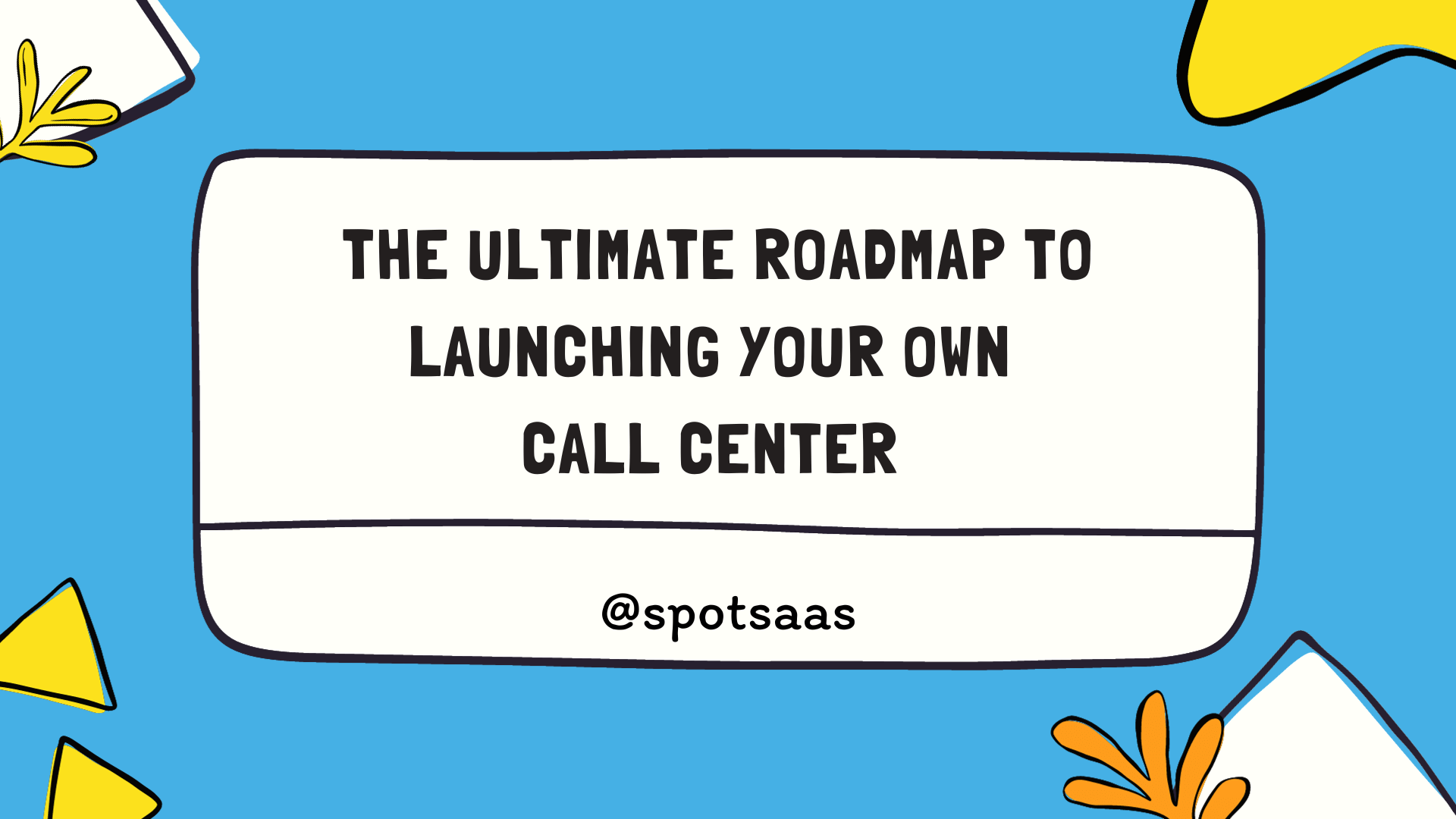Starting a call centre can certainly feel like you’re navigating through an intricate maze, with countless variables to deliberate and decisions around every corner. Take it from someone who’s walked this path before the task of building a call centre from the ground up may seem daunting, but with meticulous planning, it can morph into an exciting adventure towards success.
Through this blog post, I’ll guide you along your journey step-by-step on how to establish your very own call center – we’ll delve into everything from laying out clear objectives and choosing appropriate technologies to recruit a dynamic team and crafting effective marketing strategies.
Key Takeaways
- Create a detailed business plan to establish goals and strategies for your call center, including services, target clientele, staffing needs, and technology requirements.
- Consider the setup and focus of your contact center, such as whether it will be inbound or outbound and whether it will provide customer support or assist with marketing campaigns.
- Choose the right tools for your call center needs, such as call center software with features like automatic call distribution and interactive voice response, CRM systems for effective customer management, and performance monitoring tools to track agent productivity and call quality.
- Properly staff and train your employees by determining staffing needs based on call volume, providing thorough training programs to equip employees with necessary skills, and creating a positive team culture that fosters collaboration and motivation.
Identifying the Purpose and Main Goals of Your Call Center
To effectively start a call center, it is crucial to identify the purpose and main goals of your contact center. Creating a business plan will help define these objectives and guide your decision-making process.
Additionally, determining the setup and focus of your call center, choosing the right tools for your specific needs, staffing and training considerations, as well as defining team culture are all essential steps in this phase of the process.
Create a business plan
Creating a business plan lays the foundation for your call center’s goals and objectives. This crucial step helps clarify what you want to achieve, identify potential issues, and set clear strategies for growth.
Determining the type of call center – whether in-house or outsourced, inbound or outbound – is an essential part of this process. The business plan should include details about desired services, targeted clientele, potential revenue streams as well operational costs such as staffing needs and technology requirements.
Always ensure legal matters like entity formation and tax registrations are addressed in your plan. It forms both an internal guide for managing operations and an external proposal for securing funding if needed.
Determine the setup and focus of your contact center
Deciding on the structure and aim of your contact center is pivotal to its success. First, identify what type of center you want – it may be an inside sales department or a service-oriented contact center.
The focus could range from providing direct customer support to helping in marketing campaigns or technical assistance. Consider if it’s feasible for your operation to evolve into a virtual call center or stick with traditional settings.
This choice significantly impacts your staffing needs and the call center software tools required for efficient operations. Don’t forget that proper goal setting at this stage lays the foundation for all future decisions, from budgeting to technology selection and legal formalities such as tax registration.
Choose the tools that fit your contact center needs
Finding the appropriate tools for your contact center needs is vital.
| Aspect | Description |
|---|---|
| Evaluate Call Center Software | Choose software with features like automatic call distribution, interactive voice response, and call recording. |
| Consider CRM Systems | Adopt CRM systems that effectively manage customer interactions and data. |
| Invest in Performance Monitoring Tools | Select tools that provide data on agent productivity and call quality. |
| Utilize Workforce Management Software | Use software that assists in scheduling, predicting call volumes, and analyzing performance trends. |
| Invest in Speech Analytics Tools | Use tools that analyze customer interactions to gather valuable insights and improve service. |
| Consider Outsourcing | Weigh the benefits and drawbacks of outsourcing certain center operations. |
| Ensure Reliable Communication Infrastructure | Ensure the communication infrastructure is robust enough to support center technology needs. |
Staffing and training considerations
Proper staffing and training are crucial for the success of a call center. It is important to determine the number of staff members needed based on call volume and service goals. Training programs should be designed to equip employees with the necessary skills to handle customer inquiries efficiently and effectively.
Ongoing training is also essential to keep staff updated with new practices and technologies. By investing in a well-trained and motivated team, a call center can provide exceptional customer service and achieve its goals efficiently.
Define team culture
Creating a strong team culture is vital for the success of your center. It sets the tone for how your employees interact with each other and with customers. A positive team culture fosters collaboration, trust, and motivation among your staff members.
To define team culture, focus on establishing clear values and expectations that align with your center’s goals. Promote open communication, provide opportunities for professional growth, and encourage teamwork through team-building activities.
By cultivating a healthy team culture, you can create a supportive work environment where employees feel valued and motivated to deliver exceptional customer service.
Setting a Budget and Choosing Technology
To set a budget for your center, it is important to consider your financial resources and the expenses involved in running a call center. Choose the right calling software that fits your needs and consider using CRM and performance monitoring tools to enhance efficiency.
Decide on a budget
To start a call center, one of the crucial steps is to decide on a budget. Allocating funds will help determine the size and scale of your operations, as well as guide your financial decisions moving forward.
Take into account all aspects of running a call center, including equipment, software licenses, employee salaries and benefits, marketing expenses, and overhead costs. It’s important to carefully consider your financial resources and create a realistic budget that allows for growth and sustainability as you establish and expand your call center business.
Choose the right calling software
Selecting the appropriate calling software is a critical step in starting a call center. The right software will enhance your operations and improve customer satisfaction. Look for software that offers features such as call routing, automatic dialing, call recording, and integration with other tools like CRM systems.
You should also consider the scalability of the software to accommodate your future growth. Take into account your specific needs and budget when making this decision to ensure you choose the best calling software for your call center.
Consider CRM and performance monitoring tools
When setting up a call center, it is important to consider the use of CRM (Customer Relationship Management) software and performance monitoring tools. These tools can greatly enhance the efficiency and effectiveness of your call center operations. With CRM software, you can manage customer interactions, track sales leads, and analyze customer data to improve your overall customer service. Performance monitoring tools allow you to track key metrics such as call volume, average handling time, and customer satisfaction scores. This data can help you identify areas for improvement and make informed decisions to optimize your call center’s performance.
Hiring and Training Employees
To ensure a successful call center, it is crucial to have a strong team of employees who are well-trained and equipped to handle customer interactions. Develop a recruitment process that includes thorough screening and interviews to find the right candidates for your call center.
Measure performance regularly and provide ongoing training programs to enhance skills and keep employees motivated.
Develop a recruitment process
Developing a recruitment process is essential when starting a call center. Here are some key steps to consider:
| Step | Action |
|---|---|
| Define Roles and Responsibilities | Establish clear and specific roles and responsibilities for each position within your call center. |
| Create Job Descriptions | Formulate job descriptions that detail the skills and qualifications required for each role. |
| Determine Recruitment Channels | Choose recruitment channels, such as job boards or social media, that effectively target potential candidates. |
| Develop Application Process | Create an application process that includes screening and assessments to evaluate candidates’ suitability. |
| Establish Interview Guidelines | Develop a set of interview questions and guidelines focused on key skills and attributes. |
| Conduct Background and Reference Checks | Verify candidates’ qualifications and history through thorough background and reference checks. |
| Implement Onboarding Process | Ensure a comprehensive onboarding process to familiarize new hires with their roles and the organization. |
Measure performance
Measuring performance is a crucial aspect of running a successful call center. By regularly assessing the performance of your team, you can identify areas for improvement and make necessary adjustments.
Key metrics to measure include average handling time, first call resolution rate, customer satisfaction scores, and agent productivity. Tracking these metrics will give you insights into the efficiency and effectiveness of your operations.
Additionally, providing regular feedback and coaching sessions based on performance data can help motivate agents to perform at their best. Continuous monitoring and evaluation ensure that your call center is meeting its goals and delivering exceptional service to customers.
Create an ongoing training program
Developing an ongoing training program is crucial for the success of your call center. It helps ensure that your employees have the skills and knowledge they need to provide excellent customer service and meet your call center goals. Here are some key steps to create an effective ongoing training program:
| Step | Description |
|---|---|
| Assess Training Needs | Identify areas needing development such as communication skills, product knowledge, or technical proficiency. |
| Set Clear Learning Objectives | Establish measurable learning objectives that are in sync with call center goals for every training module or session. |
| Choose Training Methods | Select effective training methods, like classroom sessions, on-the-job training, e-learning modules, or a mix of these. |
| Develop Training Materials | Construct comprehensive training materials that encapsulate all relevant topics, providing clear instructions and examples. |
| Schedule Regular Training Sessions | Enforce a regular training schedule to ensure constant development and knowledge sharing among all team members. |
| Encourage Continuous Learning | Promote a culture that values continuous learning by offering opportunities to explore new topics and attend workshops or conferences. |
| Monitor Progress and Provide Feedback | Track employee progress using quizzes or evaluations, identifying areas needing further support or training. |
| Offer Coaching and Mentoring | Facilitate one-on-one coaching or mentoring to support employees needing additional help, enhancing their skills and confidence gradually. |
Promoting and Expanding Your Call Center Business
Market your business effectively to reach potential clients and expand your call center operations. Learn how to build a strong company culture, provide exceptional customer service, and take steps towards growing your call center business.
Marketing your business
Promoting your call center business is a crucial step in attracting clients and expanding your operations. Utilize various marketing strategies to increase brand awareness and reach potential customers.
Consider creating an online presence through social media platforms and a well-designed website that highlights the services you offer. Additionally, networking with local businesses and attending industry events can help establish valuable connections.
Don’t forget the power of word-of-mouth referrals – providing stellar customer service will encourage satisfied clients to recommend your call center to others. Stay proactive in marketing efforts to ensure continued growth for your business.
Expanding your call center
Expanding your call center is an important step towards growing your business and increasing your customer base. One way to expand is by offering additional services or expanding into new markets.
This can be done by conducting market research and understanding the needs and preferences of potential customers. Another way to expand is by increasing the capacity of your call center through hiring more staff or implementing new technologies that improve efficiency.
By expanding, you will be able to handle a higher volume of calls, provide better customer service, and ultimately increase your revenue. It’s crucial to carefully plan and strategize for expansion to ensure its success.
Additionally, building strong relationships with existing customers can also contribute to the growth of your call center. Implementing effective customer retention strategies such as loyalty programs or personalized follow-ups can help retain customers and encourage repeat business.
Moreover, investing in ongoing training programs for your employees will not only enhance their skills but also improve overall productivity in the call center. By continuously improving operations and providing stellar customer service, you can create a positive reputation for your call center and attract more clients.
Building a good company culture
Developing a strong company culture is essential for the success of your call center. By fostering a positive work environment, you can motivate and engage your employees, leading to improved performance and customer satisfaction.
Encourage open communication, collaboration, and recognition to create a supportive atmosphere where everyone feels valued. Promote teamwork through team-building activities and regular meetings to ensure that everyone is aligned with the call center’s goals.
Providing ongoing training opportunities also helps foster growth and development within your team members. By prioritizing a good company culture, you’ll set the stage for long-term success in your call center business.
Provide stellar customer service.
Providing stellar customer service is a crucial aspect of running a successful call center. It involves going above and beyond to meet the needs and expectations of your customers.
This can be achieved by training your employees to be courteous, patient, and knowledgeable in addressing customer inquiries or concerns. Promptly responding to customer calls and resolving issues in a timely manner is also essential for delivering exceptional service.
By prioritizing customer satisfaction and consistently providing outstanding support, you can build strong relationships with your customers and enhance the reputation of your call center.
To create an environment that fosters stellar customer service, it’s important to establish clear communication channels between your employees and customers. This includes having well-defined procedures for handling complaints or escalations, as well as regularly monitoring performance to ensure high-quality interactions.
Additionally, gathering feedback from customers through surveys or follow-up calls can help identify areas for improvement and allow you to make necessary adjustments to enhance their experience.
Conclusion
In conclusion, starting a call center requires careful planning and preparation. By setting clear goals, choosing the right type of center, creating a budget, hiring and training employees, and promoting your business effectively, you can establish a successful call center that delivers exceptional customer service.
With dedication and attention to detail, you can take the necessary steps to launch your own thriving call center business.
FAQs
1. What are the first steps to starting a call center?
The first steps to starting a call center include conducting market research, creating a business plan, securing funding, and finding a suitable location.
2. How much does it cost to start a call center?
The cost of starting a call center can vary widely depending on factors such as location, size, technology requirements, and staffing needs. It’s best to create a detailed budget based on your specific circumstances.
3. Do I need any special qualifications or experience to start a call center?
While having experience in customer service or managing teams can be helpful, there are no specific qualifications required to start a call center. However, knowledge of telecommunications systems and industry regulations is beneficial.
4. How long does it take to set up a call center?
The time it takes to set up a call center can vary depending on various factors such as the complexity of the operation and availability of resources. On average, it may take several months from planning stage to fully operational status.
5. What software and equipment do I need for my call center?
Common software and equipment needed for running a call center include an automatic dialer system, computer workstations with internet connectivity and headphones/microphones for agents, customer relationship management (CRM) software for tracking interactions with clients/customers,
and analytics tools for performance monitoring..




